De Amerikaanse columnist Thomas Friedman is optimistisch. Laat ze elkaar maar uitputten, schrijft hij. Daar zit iets in. Sinds meer dan een halve eeuw, te beginnen bij de Suezcrisis, put het Westen zich uit in vruchteloze interventies in de regio. De kostbaarste onderneming, in Irak, is nog niet afgelopen. Zou het niet een geweldige opluchting zijn als nu buiten onze verantwoordelijkheid die twee regionale grootmachten in een uitputtend conflict verwikkeld raakten terwijl het Westen geïnteresseerd toekeek?
Henk Hofland. De Groene Amsterdammer. 1 april 2015
In zijn ideologische voorstelling van de werkelijkheid draait H.J.A. Hofland de wereld om. Als bewaker van het Atlantisch bondgenootschap suggereert hij dat het expansionistische Westen, onder aanvoering van Washington en Wall Street, 'vredestichtend' is, en dat het handelt vanuit altruïstische motieven en niet vanuit financiële, economische en dus geopolitieke drijfveren. Het door NAVO-bases omsingelde Rusland verandert in zijn optiek in een gevaarlijke, expansionistische, westwaarts oprukkende grootmacht, en het omsingelde Iran wordt bij hem afgeschilderd als een ernstige bedreiging van de wereldvrede, waardoor de 'druk op Teheran onverminderd gehandhaafd [moet] worden,' terwijl hij het met nucleaire wapens uitgeruste Israel ineens als een bedreigde staat afbeeldt. In een poging dit waanbeeld geloofwaardig te maken bij de lezers van De Groene Amsterdammer verzwijgt de gezagsgetrouwe spreekbuis van de gevestigde wanorde historische oorzaken en onwelgevallige politieke feiten die al te zichtbaar maken hoe propagandistisch zijn columns zijn. De mainstream-consensus dient koste wat kost gehandhaafd te blijven. Vooral dit feit heeft hem juist tot de 'beste journalist van de twintigste eeuw' gemaakt, althans volgens zijn mainstream-collega's in de polder. Maar net als bij alles op aarde, en zeker in een consumptiemaatschappij, is ook Hoflands propaganda gedateerd geraakt, uitgewerkt, versleten. Wat in de vorige eeuw nog waar leek, blijkt in de 21ste eeuw al geruime tijd niets anders dan kitsch te zijn, 'a marketing phenomenon,' dat 'onze dagelijkse esthetiek en moraal' bepaalt, zoals intellectuelen als Dwight Macdonald en Milan Kundera de houding van de commerciële massamedia hebben getypeerd. Geconfronteerd met de huidige snelle ontwikkelingen en machtsverlies van Washington en Wall Street is de huidige consensus onhoudbaar geworden.
Het enige positieve aan Hoflands teksten is dat zijn beweringen vandaag de dag genadeloos onthullen welke benepen opvattingen hij altijd al heeft gehad. Dit is als het ware de straf voor het hoog bejaard zijn. De gedachten bevriezen, waardoor, net als bij ijsbloemen op een ruit, de voorheen verholen patronen ineens zichtbaar zijn. Hofland heeft zichzelf overleefd. Hetzelfde geldt voor De Groene Amsterdammer, die de 87-jarige een platform biedt voor het verspreiden van zijn reactionaire meningen. Een treffend voorbeeld daarvan is zijn nonsens dat de 'kostbaarste onderneming, in Irak' één van die 'vruchteloze interventies in de regio' is geweest, waarbij 'het Westen zich' heeft 'uitgeput,' daarmee de indruk wekkend dat de gewelddadige Amerikaanse 'interventies' in 'Irak' en elders in het Midden-Oosten bedoeld waren om, ik citeer opnieuw, 'het tij' te keren, door daar met massaal geweld een democratisch bestel te introduceren. In werkelijkheid ging het vanaf de door de CIA in 1953 georganiseerde Iraanse staatsgreep tot de 2003 'shock and awe'-inval in Irak — volgens het internationaal recht een oorlogsmisdaad — de hele tijd om een greep te houden op de olie in de regio waar meer dan 65 procent van alle commercieel exploiteerbare oliereserves liggen. Wat in 2004 de Secretaris-Generaal van de Verenigde Naties, Kofi Annan, kwalificeerde als een 'illegale' Amerikaanse agressieoorlog, die in flagrante strijd was met het 'VN-Handvest,' wordt anno 2015 door opiniemaker Henk Hofland gepresenteerd als één van die 'vruchteloze interventies in de regio,' die niet hebben kunnen voorkomen dat er nu sprake is van het
failliet van de Arabische beschaving. En sinds het begin van deze eeuw heeft het Westen metterdaad bewezen dat het daar machteloos tegenover staat. Pogingen om het tij met de oorlogen in Afghanistan en Irak te keren zijn uitgelopen op kostbare mislukkingen.
Met deze simplistische vertekening van de realiteit wordt doorgaans in totalitaire systemen de geschiedenis aangepast aan ideologische vereisten. Politiek taalgebruik 'is designed to make lies sound truthful and murder respectable, and to give an appearance of solidity to pure wind,' aldus George Orwell, en dit is precies wat de in Nederland zo gerespecteerde opiniemaker doet. Ook al verklaarde de openbaar aanklager van het Internationaal Strafhof in 2006 over aanwijzingen te beschikken 'that various war crimes had been committed' door westerse militairen in Irak, dan nog blijft Hofland pretenderen dat deze schendingen voortvloeiden uit nobele motieven, waarmee Washington en zijn NAVO zich vergeefs hebben afgemat. De Koude Oorlogsprofeet heeft geen andere keuze, op zijn oude dag kan hij domweg niet toegeven dat hijzelf een werkzaam leven lang westerse terreur heeft verdedigd. Hij moet, gevangen in zijn eigen leugen, onverstoorbaar verder in de korte tijd die hem nog van de dood scheidt. Voor alle duidelijkheid moet ik hierbij opmerken dat elk economisch systeem gebaseerd is op een valse aanname, en zeker het kapitalistische dat uitgaat van de eeuwige groei die een voortdurende winststijging mogelijk moet maken, en dat zodoende 85 miljardairs dermate rijk heeft gemaakt dat zij nu evenveel bezitten als de helft van de gehele mensheid tezamen. Dit schreeuwende onrecht is vanzelfsprekend niet aan het grote publiek te verkopen zonder leugens. Het is de taak van de 'vrije pers,' overigens net zo vrij als elke andere werknemer die doet wat wordt opgedragen, om dat wat krom is aan te bieden als recht. De opiniemakers van de massamedia moeten het onverkoopbare zodanig presenteren dat het wordt geaccepteerd door een zo groot mogelijk publiek. De achttiende eeuwse Schotse verlichtingsfilosoof David Hume merkte terecht op dat:
as Force is always on the side of the governed, the governors have nothing to support them but opinion. Tis therefore, on opinion only that government is founded; and this maxim extends to the most despotic and most military governments, as well as to the most free and most popular.
Zolang de massa de heersende propaganda slikt, heeft de macht niets te vrezen, hoe desastreus haar politiek ook mag zijn voor het heden en de toekomst. Pas wanneer de consensus geleidelijk aan verdwijnt, dreigt er gevaar voor de 'elite' en haar opportunistische woordvoerders. Zodra de ijsbloemen op de ruiten zichtbaar worden, zit er kou aan de lucht. Wanneer het gewelddadig westers expansionisme niet langer als normaal wordt aanvaard, verliezen de Hoflanden en Makken hun geloofwaardigheid bij het grote publiek en beginnen hun broodheren zich ongerust te maken. Ik zag onlangs mijn oude vriend Geert Mak bij het Albert Heijn-filiaal op de Nieuwmarkt in Amsterdam achter de schappen wegschieten toen hij mij zag aankomen, en deze reactie is tekenend voor de angst van de conformisten om met de inmiddels onontkoombare werkelijkheid te worden geconfronteerd. In plaats van in discussie te gaan, proberen ze zoveel mogelijk de realiteit te ontvluchten. Wat moeten ze anders met de werkelijkheid in hun zelf geschapen virtuele wereldje? In plaats van de oorzaken van de vele oorlogen te onderzoeken waarin de VS zijn hele geschiedenis lang verwikkeld is, beweert opiniemaker Mak verheugd dat de 'soft power' van de Verenigde Staten 'nog altijd sterk aanwezig,' is, waarbij hij het begrip als volgt verduidelijkt:
Soft power is, in de kern, de overtuigingskracht van een staat, de kracht om het debat naar zich toe te trekken, om de agenda van de wereldpolitiek te bepalen,
zonder te vermelden dat, geheel volgens de Amerikaanse 'speak softly and carry a big stick'-doctrine, de 'soft power' van de VS altijd begeleid wordt door de 'hard power' van 's wereld's zwaarst bewapende staat, waarvan de militaire uitgaven
Dwarfs Rest Of The World. The United States spends 58 percent of the total defense dollars paid out by the world's top 10 military powers, which combined for $1.19 trillion in military funding in 2011. With its unparalleled global reach, the US outspends China, the next-biggest military power, by nearly 6-to-1.
De mainstream-opiniemakers willen geen discussie aangaan over de oorzaken van het feit dat
America Has Been At War 93% of the Time – 222 Out of 239 Years – Since 1776
De Makken en Hoflanden zullen nooit aandacht besteden aan het volgende:
Over the years writers like Bradley have challenged the dominant consensus that Japan, not the U.S., had alone provoked the war and was an expansionist, militarist state, unwilling to compromise—that is, accept American demands that it surrender its leading role in China. Bruce M. Russett’s largely forgotten 1971 book, 'No Clear and Present Danger: A Skeptical View of the U.S. Entry into WWII' argued, instead, that the U.S. contributed mightily to the coming of war by its embargo's (in concert with Britain and the Dutch) of oil and raw materials on a Japan which had none of these vital resources. While 'the threat to Japan of a raw material scarcity was obvious,' the policy of 'gradually tightening economic measures,' Russett concluded, 'was an escalation that was to drive Japan not to capitulation, as it was intended to do, but to war with the United States.'
Bradley’s view is that if the Japanese had submitted to U.S. demands it would have meant abandoning China in favor of an updated imperial and pro-western Open Door Policy. But Japan saw U.S. intervention in China as no different from the Monroe Doctrine, which demanded absolute American control of the Western Hemisphere. Once its oil pipeline was shut down Japan, writes Bradley, was stranded like 'an industrialized beached whale.' Neither Tokyo nor Washington would budge, leading Dean Acheson, Henry Stimson and Henry Morgenthau, among other White House hawks, to 'set the war clock ticking in Tokyo.' Surprisingly, Bradley reveals that neither FDR nor Cordell Hull, his Secretary of State, knew that Acheson & Company had unilaterally cut off oil shipments which, the Japanese historian Akira Iriye concluded in 1981, 'had a tremendous psychological impact upon the Japanese' and led directly to Tokyo’s suicidal decision to go to war.
Geert Mak en Henk Hofland verdwijnen liever zo snel mogelijk achter de schappen van een grootgrutter dan dat ze publiekelijk of privé met iemand als ik in discussie zullen gaan over de geschiedenis van het Amerikaanse expansionisme, of over Hoflands bewering dat
[s]inds meer dan een halve eeuw, te beginnen bij de Suezcrisis, het Westen zich uit[put] in vruchteloze interventies in de regio. De kostbaarste onderneming, in Irak, is nog niet afgelopen. Zou het niet een geweldige opluchting zijn als nu buiten onze verantwoordelijkheid die twee regionale grootmachten in een uitputtend conflict verwikkeld raakten terwijl het Westen geïnteresseerd toekeek?
Het opmerkelijke hierbij is dat de columnist van De Groene onmiddellijk daarop stelt:
Vergeleken met de praktijk die we in de regio hebben klinkt het relatief aanlokkelijk. Maar het is theorie. Ten eerste kan het Westen zich niet veroorloven een van zijn belangrijkste olieleveranciers in de steek te laten.
Met andere woorden: niet vanwege enig respect voor het internationaal recht en ook niet vanuit humanitaire motieven, maar louter en alleen vanwege de olieprijs zijn Hofland en de 'politiek-literaire elite' in de polder bereid af te zien van de 'geweldige opluchting' die het bloedbad in het Midden-Oosten hen zou verschaffen. Van welke psychische stoornis is deze houding een symptoom, en wat is deze gruwelijke onverschilligheid precies? De joods-Amerikaanse Nobelprijswinnaar voor de Vrede, Elie Wiesel, die als overlevende van Auschwitz en Buchenwald zonder overdrijving een ervaringsdeskundige bij uitstek genoemd kan worden zei er dit over:
The opposite of love is not hate, it's indifference. The opposite of art is not ugliness, it's indifference. The opposite of faith is not heresy, it's indifference. And the opposite of life is not death, it's indifference.
Onverschilligheid. 'Geïnteresseerd' toekijken naar 'een uitputtend conflict' is een ziekelijke reflex van mensen die haten, en geen enkele geloof bezitten in wat dan ook, mensen van wie de ziel dood is. Het verraadt de geestesgesteldheid van een gestoord kind dat met plezier de vleugels van een vlinder aftrekt om te kijken hoe het beestje crepeert. Hofland is bereid van dit 'genot' af te zien vanwege het feit dat
Saoedi-Arabië een van de belangrijkste olieleveranciers van het Westen [is]. Na de Jom Kippoeroorlog speelde het in 1973 een belangrijke rol in de ontwrichtende olieboycot. Dit is een van de redenen waarom we het regime daar zo opzichtig te vriend houden. De vermoedelijke ontwikkeling van een kernwapen door Iran heeft een tegengesteld effect. Het moet verhinderd worden dat het land zich tot een kernmogendheid zal ontwikkelen. Onder de nu geldende omstandigheden zou de Iraanse bom een kernoorlog met Israël onduldbaar dichtbij brengen. Er bestaat tussen die landen geen diplomatie die dit uiterste zou kunnen voorkomen. Vandaar ook het eindeloze internationale overleg in Lausanne.
Na eerder in De Groene beweerd te hebben dat 'Sinds jaren Iran aan zijn eigen kernwapen [werkt],' spreekt hij vervolgens over de 'vermoedelijke ontwikkeling van een kernwapen door Iran.' Naast het feit dat die twee beweringen haaks op elkaar staan, berichtte bovendien de New York Times op 24 februari 2012:
American intelligence analysts continue to believe that there is no hard evidence that Iran has decided to build a nuclear bomb.
Recent assessments by American spy agencies are broadly consistent with a 2007 intelligence finding that concluded that Iran had abandoned its nuclear weapons program years earlier, according to current and former American officials. The officials said that assessment was largely reaffirmed in a 2010 National Intelligence Estimate, and that it remains the consensus view of America’s 16 intelligence agencies.
Desondanks blijft Hofland schrijven over 'De Iraanse bom' en 'De bom van Iran' die 'vermoedelijk' in 'ontwikkeling' is. Kortom, de niet in 'ontwikkeling' zijnde 'Iraanse bom' zal volgens hem 'een kernoorlog met Israël onduldbaar dichtbij brengen.' Aan deze redenering ontbreekt logica, maar dat is voor de redactie en het publiek van De Groene Amsterdammer geen merkbaar probleem, de zelfgenoegzame intelligentsia in Nederland slikt van alles voor zoete koek, dus ook de propaganda van een 87-jarige Koude Oorlogsprofeet met een ziekelijke hang naar geweld. Volgende keer meer over de man die het als een groot probleem ervaart dat
[s]inds 9/11 het Westen [heeft] bewezen dat het zijn politici en generaals ontbreekt aan het krijgskundig inzicht dat nodig is om in de regio een oorlog overtuigend te winnen. Na veertien jaar en een lange reeks militaire experimenten weten we nog niet hoe de oorlog in de regio moet worden gevoerd.
Let op: Hofland schrijft wederom 'we,' wanneer hij de westerse economische elite en haar militair-industrieel complex bedoelt. 'WE.' Weer een leugen, want 'WE' tellen niet mee in een neoliberale cultuur.
Leading Papers Incite ‘Supreme International Crime’

Op-eds in the Washington Post (left) and New York Times called for unprovoked military attacks on Iran.
After the New York Timesprinted John Bolton’s “To Stop Iran’s Bomb, Bomb Iran” (3/26/15; FAIR Blog, 3/26/15), following the Washington Postpublishing Joshua Muravchik’s “War With Iran Is Probably Our Best Option” (3/13/15), veteran investigative reporter Robert Parry made an excellent point (Consortium News, 3/28/15):
If two major newspapers in, say, Russia published major articles openly advocating the unprovoked bombing of a country, say, Israel, the US government and news media would be aflame with denunciations about “aggression,” “criminality,” “madness” and “behavior not fitting the 21st century.”
But when the newspapers are American – the New York Times and the Washington Post – and the target country is Iran, no one in the US government and media bats an eye. These inflammatory articles – these incitements to murder and violation of international law – are considered just normal discussion in the Land of Exceptionalism.
Advocating for war is not like advocating for most other policies because, as peace activist David Swanson points out, war is a crime. It was outlawed in 1928 by the Kellogg-Briand Pact, in which the United States, the Soviet Union, China, Britain, Germany, France, Japan and 55 other nations “condemn[ed] recourse to war for the solution of international controversies, and renounce[d] it, as an instrument of national policy in their relations with one another.”

Defendants at Nuremberg were found guilty and hanged for carrying out the policies advocated by the Washington Post and New York Timesop-ed pages.
Kellogg-Briand was the basisfor the “crimes against peace” indictment at the Nuremberg Trials for Nazi leaders, several of whom were hangedfor “planning, preparation, initiation, or waging a war of aggression.” At Nuremberg, chief US prosecutor Robert H. Jackson declared:
To initiate a war of aggression, therefore, is not only an international crime; it is the supreme international crime differing only from other war crimes in that it contains within itself the accumulated evil of the whole.
The spirit of Kellogg-Briand was embodied in the formation of the United Nations, whose charter commits its signers to renouncing war and the threat of war:
All Members shall refrain in their international relations from the threat or use of force against the territorial integrity or political independence of any state.
So to advocate for war, as the Washington Post and New York Times op-ed pages have done, is to incite a crime–“the supreme international crime,” as Jackson noted. How would we react if leading papers were to run articles suggesting that genocide was the best solution to an international conflict–or that lynching is the answer to domestic problems? Calling for an unprovoked military attack against another nation is in the same category of argument.
The Washington Post can be reached at letters@washpost.com or via Twitter @washingtonpost. The New York Times‘ email is : letters@nytimes.com and Twitter account is @nytimes. Remember that respectful communication is most effective.
Op-eds in the Washington Post (left) and New York Times called for unprovoked military attacks on Iran.
After the New York Timesprinted John Bolton’s “To Stop Iran’s Bomb, Bomb Iran” (3/26/15; FAIR Blog, 3/26/15), following the Washington Postpublishing Joshua Muravchik’s “War With Iran Is Probably Our Best Option” (3/13/15), veteran investigative reporter Robert Parry made an excellent point (Consortium News, 3/28/15):
If two major newspapers in, say, Russia published major articles openly advocating the unprovoked bombing of a country, say, Israel, the US government and news media would be aflame with denunciations about “aggression,” “criminality,” “madness” and “behavior not fitting the 21st century.”But when the newspapers are American – the New York Times and the Washington Post – and the target country is Iran, no one in the US government and media bats an eye. These inflammatory articles – these incitements to murder and violation of international law – are considered just normal discussion in the Land of Exceptionalism.
Advocating for war is not like advocating for most other policies because, as peace activist David Swanson points out, war is a crime. It was outlawed in 1928 by the Kellogg-Briand Pact, in which the United States, the Soviet Union, China, Britain, Germany, France, Japan and 55 other nations “condemn[ed] recourse to war for the solution of international controversies, and renounce[d] it, as an instrument of national policy in their relations with one another.”
Defendants at Nuremberg were found guilty and hanged for carrying out the policies advocated by the Washington Post and New York Timesop-ed pages.
Kellogg-Briand was the basisfor the “crimes against peace” indictment at the Nuremberg Trials for Nazi leaders, several of whom were hangedfor “planning, preparation, initiation, or waging a war of aggression.” At Nuremberg, chief US prosecutor Robert H. Jackson declared:
To initiate a war of aggression, therefore, is not only an international crime; it is the supreme international crime differing only from other war crimes in that it contains within itself the accumulated evil of the whole.
The spirit of Kellogg-Briand was embodied in the formation of the United Nations, whose charter commits its signers to renouncing war and the threat of war:
All Members shall refrain in their international relations from the threat or use of force against the territorial integrity or political independence of any state.
So to advocate for war, as the Washington Post and New York Times op-ed pages have done, is to incite a crime–“the supreme international crime,” as Jackson noted. How would we react if leading papers were to run articles suggesting that genocide was the best solution to an international conflict–or that lynching is the answer to domestic problems? Calling for an unprovoked military attack against another nation is in the same category of argument.
The Washington Post can be reached at letters@washpost.com or via Twitter @washingtonpost. The New York Times‘ email is : letters@nytimes.com and Twitter account is @nytimes. Remember that respectful communication is most effective.
http://fair.org/home/leading-papers-incite-supreme-international-crime/

 There’s now a new version of the headline, which appropriately inserts a source for the claim of Russian hacking:
There’s now a new version of the headline, which appropriately inserts a source for the claim of Russian hacking:
 Unless CNN has its own experts on cybersecurity who are independently evaluating the evidence, the network is really not in a position to be making charges in its own voice about international computer espionage. By attributing the claim, USA Today‘s headline did it right, while at the same time pointing up how CNN was doing it wrong.
Unless CNN has its own experts on cybersecurity who are independently evaluating the evidence, the network is really not in a position to be making charges in its own voice about international computer espionage. By attributing the claim, USA Today‘s headline did it right, while at the same time pointing up how CNN was doing it wrong.
April 10, 2015 "ICH" - Today I’ve got docs on Russia and Ukraine for you. The West got used to solving its problems using someone else to do the dirty work. Putin’s regime is an eyesore for the U.S., UK and NATO. Regardless whether it’s good or bad (everyone has his own opinion) Russia opposes the unipolar world order and western values exclusiveness. The West has a simple solution; it just needs to overthrow Putin and his close companions.
The West can’t do it openly and directly. Russia isn’t Yugoslavia, or Libya, or Iraq. That’s why they are acting via Ukraine which is undergoing dramatical changes now. Though they are using the old methods of ideological warfare, discredit of leaders, and society values erosion.
The attached docs show that NATO and the U.S. and UK military advisors are acting in Ukraine. Non-governmental organizations are working there under the auspices of the Western and Ukrainian special services.
For instance, here’s a NATO doc testifying that the popularity of the Russian leaders among the population of the Southern and Eastern regions is a challenge for Ukraine.
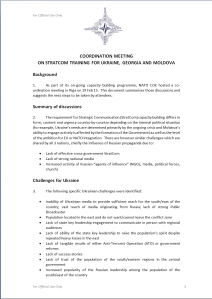




Download: COORDINATION MEETING ON STRATCOM TRAINING FOR UKRAINE, GEORGIA AND MOLDOVA
The Ukrainian non-governmental organizations mention the same issue in their docs drawn up to win the grant from the UK government.




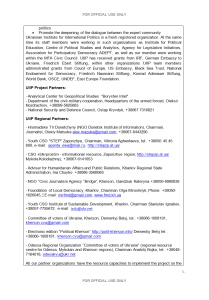

Download: Conflict Pool Project
The Russian leaders such as Putin, Lavrov, Shoigu, etc. should be put under constant pressure. As you can see this task is included in the Free Donbass and Free Russia PSYOPs designed by the Ukrainian special services.


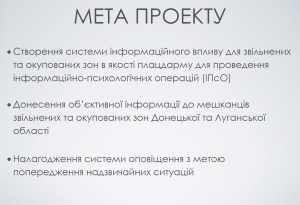

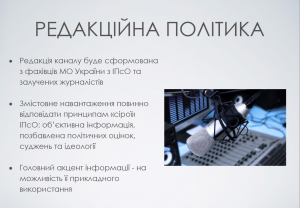
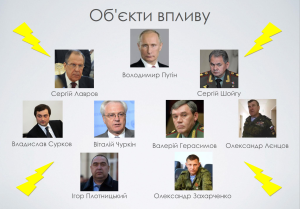
Download: FREE Donbass


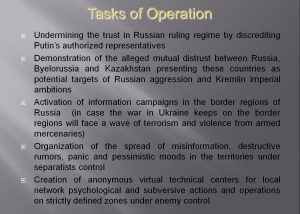

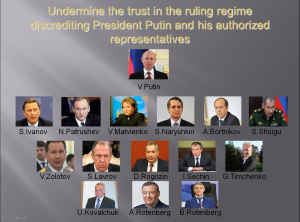
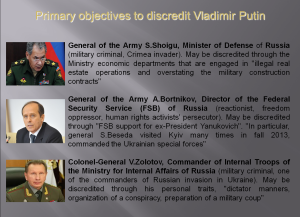
Download: Free Russia
The later clearly defines primary targets for the information attack. These people are obviously those legs bearing Putin’s throne. And as I see it that will be perfect if the Russian President knock them out by himself.
So they plan to compromise defense minister Shoigu, who is extremely popular in Russia, through facilities management and economic activity of his subordinates as well as through corruption cases revealed by the defense ministry itself. Bortnikov, the head of the secret police, can be blamed for failing to preserve Yanukovich regime in Ukraine. And general Zolotov, the Russian National Guard commander, is to be presented before Putin as a dangerous successor, potential dictator and accuse him of military coup attempts.
Since Russia and Ukraine still have common media space the idea is that Russian liberal media and opposition should take on spreading all info in the net and press created by the Ukrainian and Western secret services. The leading Western mass media are to cover this info as well.
I don’t doubt that the West will initiate color revolution processes in Russia through Ukraine sooner or later.
http://thesaker.is/
http://www.informationclearinghouse.info/article41514.htm
CNN Wants to Believe: White House ‘Russian Hackers’ Go From Suspects to Perps
On the basis of scant evidence, CNN identified the alleged White House hackers as Russian agents. (Artist’s conception.)
CNN (4/8/15) ran a story about “Russian hackers” getting into the White House computer system that needed to get out of the White House PR system.
The story, by Evan Perez and Shimon Prokupecz, began with:
Russian hackers behind the damaging cyber intrusion of the State Department in recent months used that perch to penetrate sensitive parts of the White House computer system, according to US officials briefed on the investigation.
The phrasing implies that the responsibility of said hackers from Russia for an earlier “cyber intrusion” is proven fact, and what the “US officials” (the main source for the news in this piece, along with “investigators”) are adding is their culpability in a second security breach.
But if you follow the link in that lead, you find another CNN story (3/10/15) written last month by the same writers, and here’s its complete presentation of the evidence for the “Russian hackers” involvement:
Russian hackers, likely working for the Russian government, are suspected in the State Department hack.
I was going to ask what new evidence in the past month changed the Russians from suspects to convicted criminals, but it actually happened in the space of just eight words, because that much further down in that same piece from last month, there’s a new paragraph that begins:
In part because of the Russian attack on State….
A similar rush from allegation to fact happens in the more recent piece. The evidence, again, could hardly be more cursory:
The intrusion was routed through computers around the world, as hackers often do to hide their tracks, but investigators found tell-tale codes and other markers that they believe point to hackers working for the Russian government.
Unnamed “investigators”–who may come from the “FBI, Secret Service [or] US intelligence agencies,” we learn earlier in the piece–“believe” there are “tell-tale codes and other markers” that “point to” Russian government employees–how much fuzzier does evidence get? Yet immediately CNN is talking about the “Russian hack” as though it’s proven fact:
National Security Council spokesman Mark Stroh didn’t confirm the Russian hack, but he did say that “any such activity is something we take very seriously.”
“The Russian hack”–the definite article is called “definite” for a reason; the sentence would read much differently if it referred to “a Russian hack.”
The Russians reappear as certain culprits in the State Department caper:
The State Department computer system has been bedeviled by signs that despite efforts to lock them out, the Russian hackers have been able to reenter the system.
And the certainty of Russian guilt is a jumping off point for observations about the geopolitical scene:
The ferocity of the Russian intrusions in recent months caught US officials by surprise, leading to a reassessment of the cybersecurity threat as the US and Russia increasingly confront each other over issues ranging from the Russian aggression in Ukraine to the US military operations in Syria.
(Note that in the CNN stylebook, Russia commits “aggression” whereas the US carries out “military operations.”)
A similar lack of skepticism is evident as the article ties the alleged hacking into electoral politics (“The Russian breach is believed to have come after [Hillary] Clinton departed State”) and domestic law-making:
Sen. Susan Collins said the revelations of the Russian hack “are troubling and further expose that our nation’s defenses against cyber-attacks are dangerously inadequate.”
The word “revelations” means that something actual has been revealed–whereas not only doesn’t CNN know for a fact that Russians hacked anything, it doesn’t even claim that the US government is certain about Russian guilt. (The story says investigators say they have evidence they “believe point[s] to” Moscow’s involvement.) That’s why you use a word like “accusations” or “allegations”–or, better yet in this case, “suspicions.”
I do want to commend CNN editors for one decision, namely changing the article’s headline. Here’s the piece’s original title, as preserved by Google (also visible in the article’s Web tab and URL):
Now, I’m glad they changed the headline; headlines, as the most-read text of a piece, are important. But they didn’t change it fast enough to prevent USA Today (4/7/15) from picking up the story and giving it this headline:
Documents Showing How the Empire Plans to Overthrow Putin
By The Saker and Drakula’s Blog
By The Saker and Drakula’s Blog
This information was posted on an anonymous blog Drakula’s blog: http://drakulablog.com/2015/04/01/west-and-ukraine-against-putin-and-his-politicians/. It looks very credible to me. Just take a look here for comparison purposes.
The Saker
West and Ukraine against Putin and his politicians
The West can’t do it openly and directly. Russia isn’t Yugoslavia, or Libya, or Iraq. That’s why they are acting via Ukraine which is undergoing dramatical changes now. Though they are using the old methods of ideological warfare, discredit of leaders, and society values erosion.
The attached docs show that NATO and the U.S. and UK military advisors are acting in Ukraine. Non-governmental organizations are working there under the auspices of the Western and Ukrainian special services.
For instance, here’s a NATO doc testifying that the popularity of the Russian leaders among the population of the Southern and Eastern regions is a challenge for Ukraine.





Download: COORDINATION MEETING ON STRATCOM TRAINING FOR UKRAINE, GEORGIA AND MOLDOVA
The Ukrainian non-governmental organizations mention the same issue in their docs drawn up to win the grant from the UK government.






Download: Conflict Pool Project
The Russian leaders such as Putin, Lavrov, Shoigu, etc. should be put under constant pressure. As you can see this task is included in the Free Donbass and Free Russia PSYOPs designed by the Ukrainian special services.






Download: FREE Donbass






Download: Free Russia
The later clearly defines primary targets for the information attack. These people are obviously those legs bearing Putin’s throne. And as I see it that will be perfect if the Russian President knock them out by himself.
So they plan to compromise defense minister Shoigu, who is extremely popular in Russia, through facilities management and economic activity of his subordinates as well as through corruption cases revealed by the defense ministry itself. Bortnikov, the head of the secret police, can be blamed for failing to preserve Yanukovich regime in Ukraine. And general Zolotov, the Russian National Guard commander, is to be presented before Putin as a dangerous successor, potential dictator and accuse him of military coup attempts.
Since Russia and Ukraine still have common media space the idea is that Russian liberal media and opposition should take on spreading all info in the net and press created by the Ukrainian and Western secret services. The leading Western mass media are to cover this info as well.
I don’t doubt that the West will initiate color revolution processes in Russia through Ukraine sooner or later.
http://thesaker.is/
http://www.informationclearinghouse.info/article41514.htm








Geen opmerkingen:
Een reactie posten